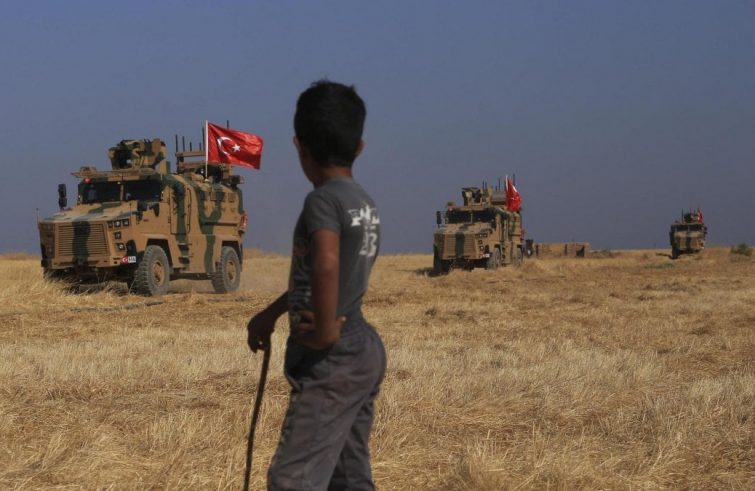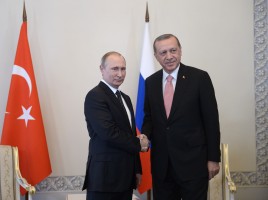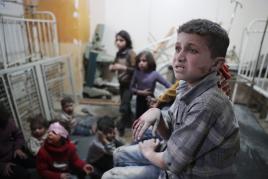
“Fighting rages unceasingly. Two days ago we witnessed the shooting down of a Syrian plane by the Turkish forces. There are many deaths among the Syrian and rebel-backed Turkish soldiers. But the numbers are impossible to determine as the data is biased by propaganda, a war running parallel to the one fought on the ground.”
 It’s the first-hand account of Franciscan Father Hanna Jallouf, from the Custody of the Holy Land, parish priest of the Latin church in Knaye, one of three Christian villages in the Orontes Valley (the others are Yacoubieh and Gidaideh, all approximately 50 km from Idlib), in the province of Idlib, north-west Syria, under the control of the jihadist forces of Tahrir al-Sham, opponents of President Assad’s regime. “At least a cease-fire” is hoped to be agreed by Putin and Erdogan who will be meeting in Moscow today to discuss the ongoing current crisis in Idlib and hopefully reach an accord.
It’s the first-hand account of Franciscan Father Hanna Jallouf, from the Custody of the Holy Land, parish priest of the Latin church in Knaye, one of three Christian villages in the Orontes Valley (the others are Yacoubieh and Gidaideh, all approximately 50 km from Idlib), in the province of Idlib, north-west Syria, under the control of the jihadist forces of Tahrir al-Sham, opponents of President Assad’s regime. “At least a cease-fire” is hoped to be agreed by Putin and Erdogan who will be meeting in Moscow today to discuss the ongoing current crisis in Idlib and hopefully reach an accord.
 The Moscow summit. “I believe – said Father Jallouf – that the fierce fighting of the past few days gives both sides the opportunity to gain more ground and thus present themselves in a strong position at the meeting. The situation is expected to become less tense after the summit.
The Moscow summit. “I believe – said Father Jallouf – that the fierce fighting of the past few days gives both sides the opportunity to gain more ground and thus present themselves in a strong position at the meeting. The situation is expected to become less tense after the summit.
Erdogan and Putin hold the keys to the conflict.
In all likelihood – said Father Jallouf – they will create a demarcation line separating the warring factions. They will draw new maps, since those outlined in Sochi became obsolete as a result of events, in order to end the war”. Under the Sochi agreements, signed by Russia and Turkey, the province of Idlib was designated a “de-escalation zone”. Turkey’s obligation under the deal was the demilitarization of rebel militias, unfulfilled according to Russia. “Here people are saying that a ‘buffer zone’ will be created near the border with Turkey to resettle hundreds of thousands of displaced people from the Idlib area who fled in the last few months as a result of the fighting”, added the Franciscan priest. In his view, “the outcome of the Moscow summit will also affect the situation in Turkey, where Erdogan opened his country’s borders for migrants who sought refuge from Syria a few years ago to cross into Greece and thus into Europe. “It must be said” said Father Hanna, “that the refugees arriving at the Greek border don’t include those from Idlib. The latter are massed at the Turkish-Syrian border.”
Humanitarian emergency. “We are facing an exodus”, said the friar of the Custody, “the vast majority of displaced persons are women, elderly people and children. Men are engaged in combat. They are lacking everything, they sleep outdoors. We are trying to help them to the best of our – scarce – resources.
For those without anything, even a piece of bread is a lot.
 The most fortunate sleep in cars, although a large number of people sleep in old tents, under trees, even in hen houses. Those who can open their homes to the displaced. We see unbelievable suffering. It’s a war of numbers also for displaced persons – pointed out Father Jallouf – they could be over 300,000, but experts say they could number one million. As far as we know there are at least 300,000 people still in Idlib. Most of its inhabitants have long since left. Shiites and Alautians – explained the parish priest – fled many years ago, when the Sunni rebels arrived here.” The few ones left form part of a local Christian community scattered in the villages of Knayeh, Yacoubieh and Gidaideh that Father Jallouf attends to together with his confrere Louai Bsharat. They are the only religious remaining in the area. “All priests and religious fled after many churches and places of worship were destroyed or burnt down” pointed out Father Hanna, abducted by Al Qaeda militants in 2014.
The most fortunate sleep in cars, although a large number of people sleep in old tents, under trees, even in hen houses. Those who can open their homes to the displaced. We see unbelievable suffering. It’s a war of numbers also for displaced persons – pointed out Father Jallouf – they could be over 300,000, but experts say they could number one million. As far as we know there are at least 300,000 people still in Idlib. Most of its inhabitants have long since left. Shiites and Alautians – explained the parish priest – fled many years ago, when the Sunni rebels arrived here.” The few ones left form part of a local Christian community scattered in the villages of Knayeh, Yacoubieh and Gidaideh that Father Jallouf attends to together with his confrere Louai Bsharat. They are the only religious remaining in the area. “All priests and religious fled after many churches and places of worship were destroyed or burnt down” pointed out Father Hanna, abducted by Al Qaeda militants in 2014.
“Our faithful often say: When will our turn come? What will become of us?”
 “They fear for their lives, worrying that they will have to run away and abandon everything. I tell them not to be afraid, that God is with us and will help us as He has always done in these years of war.” But fear is widespread and it is fuelled “by the local muezzins who warn of the arrival of the Persians (Iranian Shiite Pasdarans fighting alongside Assad, ed.’s note.) announcing unbearable violence to men and women. This dismal scenario drives many people to flee.” “Today we can only wait for the end of the violence – concluded Father Jallouf – The outcome of the fighting on the ground is marked by victorious chants or by the silence of defeat of the Tahrir al-Sham rebels.”
“They fear for their lives, worrying that they will have to run away and abandon everything. I tell them not to be afraid, that God is with us and will help us as He has always done in these years of war.” But fear is widespread and it is fuelled “by the local muezzins who warn of the arrival of the Persians (Iranian Shiite Pasdarans fighting alongside Assad, ed.’s note.) announcing unbearable violence to men and women. This dismal scenario drives many people to flee.” “Today we can only wait for the end of the violence – concluded Father Jallouf – The outcome of the fighting on the ground is marked by victorious chants or by the silence of defeat of the Tahrir al-Sham rebels.”
“Meanwhile, we pray for all those suffering from this war, especially for children, all innocent victims. They die as a result of the bombs, because of the cold, the die of hunger, and, it should be remembered, also as a result of international sanctions that heavily affect the Syrian population.”










